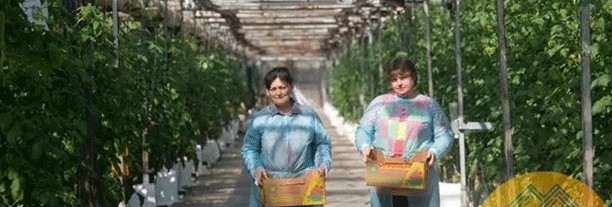The Alania greenhouse complex, located in the Prigorodny district of North Ossetia, has officially started production with the planting of its first tomato crop. This new facility is set to significantly impact the local economy and food supply chain, producing up to 20,000 tons of tomatoes annually. Covering an area of more than 40 hectares, the complex will operate year-round, supplying both the local market and broader Russian markets with fresh, high-quality tomatoes.
Economic and Employment Impact:
The Alania greenhouse complex has not only introduced a major agricultural development in North Ossetia but also created over 900 jobs for the local community. This job creation is a critical benefit in a region where employment opportunities can be limited. As the greenhouse reaches its full production capacity in two years, it is projected to generate approximately 200 million rubles annually for the regional budget, according to reports from the North Ossetian government’s press service.
Year-Round Production and Distribution:
The facility will utilize cutting-edge greenhouse technologies to maintain optimal growing conditions, ensuring year-round production regardless of external weather conditions. This is crucial for supplying fresh tomatoes throughout the year, reducing reliance on imports and enabling North Ossetia to become more self-sufficient in food production. The tomatoes grown in the Alania complex will not only meet local demand but will also be distributed across the country, offering fresher produce to consumers.
Sustainability and Food Security:
The Alania greenhouse is a significant step towards sustainable agriculture in North Ossetia. The controlled environment allows for pesticide-free farming, ensuring healthier produce for consumers and less environmental impact. By reducing the carbon footprint associated with transporting tomatoes from far-flung regions, the complex contributes to the overall sustainability of the agricultural sector in Russia.
Future Prospects:
As the Alania greenhouse reaches its full production capacity, it will continue to be a vital part of North Ossetia’s agricultural landscape. The complex’s ability to produce high-quality tomatoes year-round will be a model for other regions in Russia looking to increase their self-sufficiency in food production. The continued development and expansion of similar facilities could provide a sustainable solution to food security challenges across the country.
The Alania greenhouse complex represents a significant advancement in agricultural development for North Ossetia. By providing a steady supply of fresh, locally-grown tomatoes, it not only supports food security but also contributes to economic growth and job creation in the region. As the complex expands and reaches full production, it will continue to play a crucial role in the sustainable development of North Ossetia’s agriculture.










